Sometimes we had to pay for the privilege of posing with them...

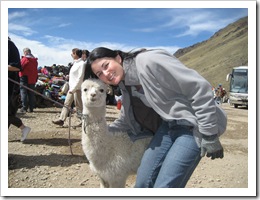
Sometimes we could play with them for free. Although in this picture it's hard to tell which one the llama is. They both seem to visit the same barber.

Sometimes the llamas were only interested in us if we gave them gifts.

or fed them...
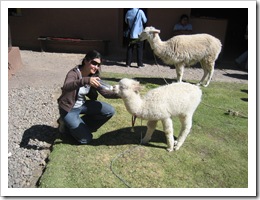
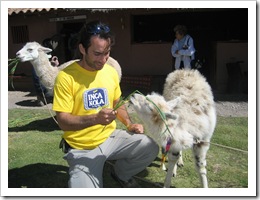
But this one wasn't interested in us at all. No matter how we called him, offered him flowers or food, he just would not budge.
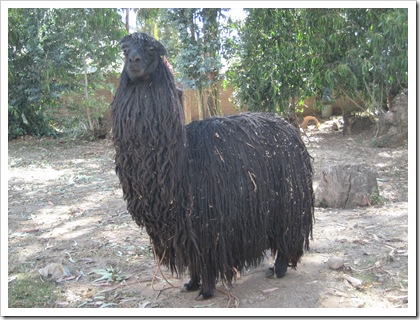
In Peru, we noticed a disturbing item on food menus, the guinea pig. Later we learnt that these creatures are not only of religious significance but they are also pretty tasty when deep fried. We cannot verify this but generally anything deep fried tastes good so we would not be surprised if this was true.
It was the Incas who first domesticated the guinea pig and used them for food. At this time, people used to worship animals, especially those that were domesticated. After the Spanish arrived, the guinea pig was incorporated as a religious symbol. It is not uncommon to see depictions of Christ and his disciples dining on guinea pig at the last supper.

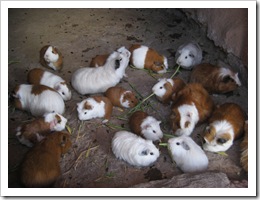
If you had to guess what the picture below is of, what would you say? An ant hill? A pile of rocks? A ruin? If you guessed the world's smallest volcano you would be right. Unfortunately, we did not stop and have breakfast here. If we had, we would have been able to learn the subtle art of frying eggs using the heat of the volcano.
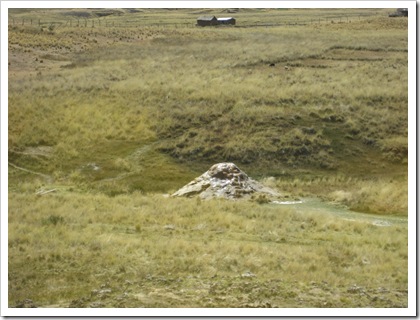
Below is a picture taken at Raqchi - a remarkable Inca construction made from adobe and built on volcanic rock. The photo on your right is part of the Wiracocha temple which was an impressive 100 meters tall.
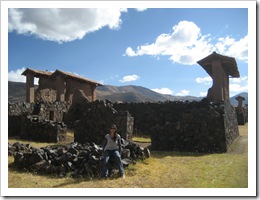
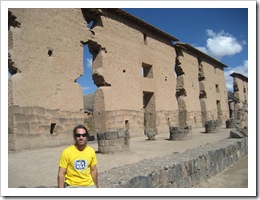
After our meanderings through the living quarters and storage rooms in the ruins, we wondered through the markets stalls outside.

There was only one thing we were interested in buying - freshly squeezed orange juice. Here Jez demonstrates how to turn orange peel into spaghetti.
Finally, after 7 hours we arrived in Cuzco, the mythical city of the Inca empire. However, this place feels more like the tourist capital of Peru. Although very attractive, we could not wait to hop on a local bus and discover the secrets of the Sacred Valley.

The Sacred Valley is a horticulturalist's dream. It is a stunning and dramatic landscape with ideal climatic conditions and fertile land. It is easy to see why this valley was chosen as a settlement point for the Incas. And of course why it is a favoured spot for day trips. We were not interested in a whirlwind tour. We wanted to take our time and stay in the valley for a night. After working out the chaotic local bus system, we made our way to Pisac. Here they have wonderful markets and a hill which we could climb to see some Inca ruins.
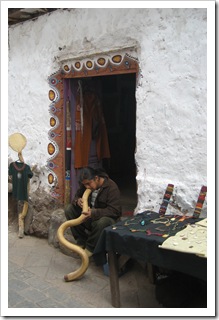
TZ took a small breather (or rather a large breather considering how thin the air was) while Jez went for a wonder. He discovered what looked like a miniature version of Machu Picchu. He asked someone to take a photo of him so he could come back and show me what I was missing out on.
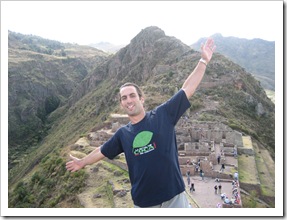
Unfortunately, one must be very careful of who they ask to take their photos. A peril all travellers are subject to. As you can see by the photo above, it was almost impossible for TZ to really understand what the big fuss was about. But as you can see by the photos below, the valley and agricultural terraces creeping up the mountain slopes are stunning.
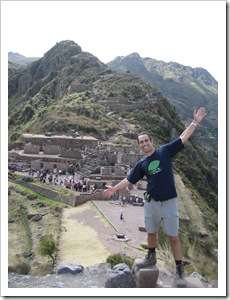
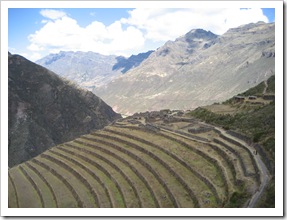
That night we made our way to a place called Ollantaytambo. (For what its worth, we recommend trying to say this name. It's quite fun when you get your tongue around it.) Anyway, this town is very beautiful and was built on top of original Inca foundations. It is particularly famous because it is the only town that the Spanish did not conquer.

Behind the town, is an Inca religious site. It was very convenient that the site was only 10 minutes from our hostel. You can see behind these buildings the steps leading up to Temple Hill. We happily left our trusty compass behind that day.
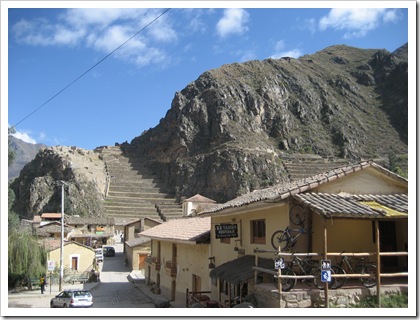
That said, our hostel owner had a dog...and so you probably know by now that if we are about to go out and a dog is anywhere near us*, he will naturally escort us.
*See similar dog stories here in Salta and here in the Colca Canyon.
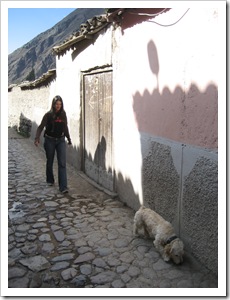
When we arrived at the sight we organised a guide to take us around. Our dog was very happy to share guiding duty, patiently waiting for us to catch up with him where ever he was.
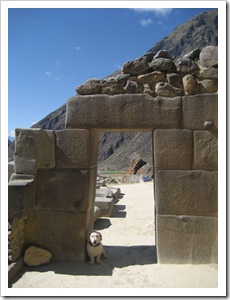
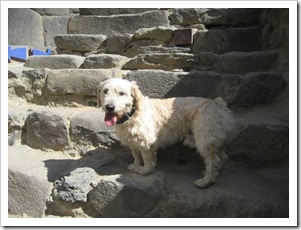
While we relaxed on a rock, our guide told us how the temple was built using enormous rocks which people carried up the hill from a nearby area. You can see these rocks below. Notice the grooves in them which were created so that walls could be built up with interlocking rocks. Not mortar was used between the rocks. This was the ingenuity in Inca architectural.

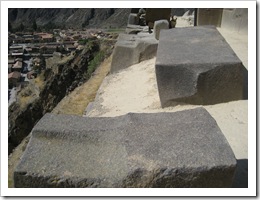
The Incas built several storehouses on the hills surrounding Ollantaytambo. They were constructed at high altitudes, where there is more wind and the temperatures are lower. This helped defend the contents against decay. It is a little hard to tell from this photo but there really is a store house on the side of the mountain!
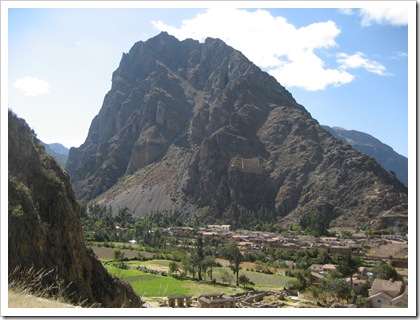
The best bit was yet to come. Click on the video below to view the method in which the purity of a person could be tested. Those that were not deemed pure were prohibited from entering the temple. Turn the volume up loud to hear over the gushing water.
Note: Our puppy followed us down here and just as we were about to shoot the video, he decided to take a bath in the sacred waters.
Around Cuzco there are some other interesting ruins to see. Read the following sign (a few times if necessary) to see why TZ is posing below.
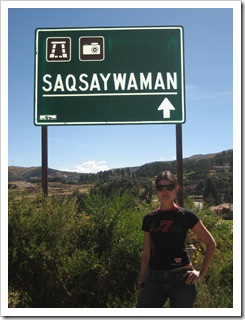
Saqsaywaman (the ruin) is considered one of the new 7 wonders of the world. It was an important religious site for the Incas. It is constructed with enormous boulders that were put together perfectly again without using mortar. The heaviest bolder weighs up to 125 tons.
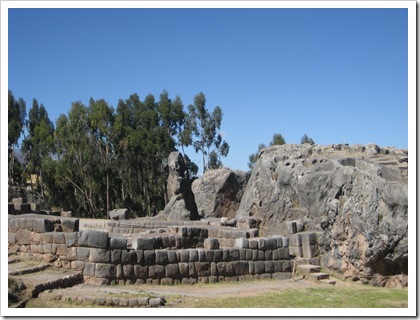
And sitting on his throne is Saqsayman.
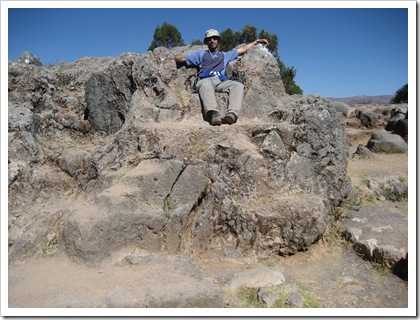
Did you miss the llamas already? Here is another photo. After we snapped this guy rounding up his llamas he insisted we pay him!
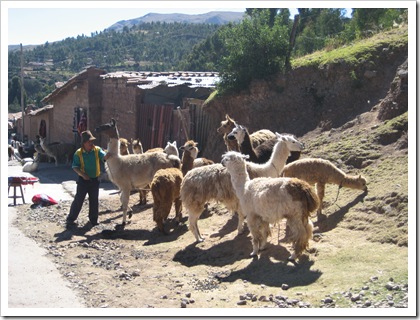
A little further down the road, we lunched at a restaurant that had its own trout farm. The owner had several staff to clean the algae infested swamp of a lake. At the same time, he sold food so that people could feed the trout. That's one way to solve the unemployment problem...
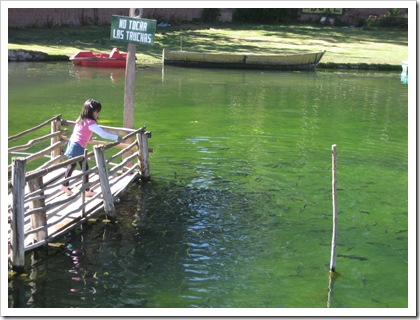
In a separate excursion, we visited a very interesting place called Moray. Here there is a rather unusual land formation - circular shaped terraces in an amphitheatre of sorts. The site was apparently an Inca agricultural research station designed for experimenting with crops at various altitude.
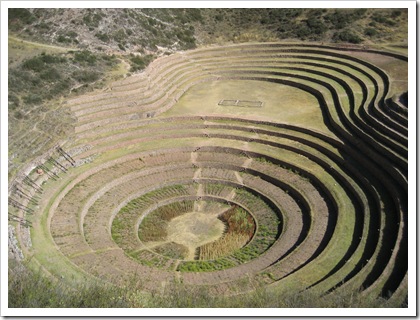
We did some experimenting of our own. How would Jez fare at the very bottom layer in the middle?
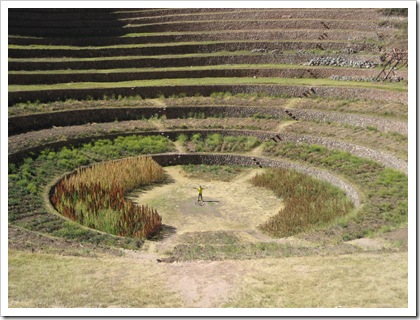
He was faring a little too well, slowly turning into a crop. You can see just the head of him at the back...

So TZ came to rescue Jez.

Since we were in the area, we heard there was a salt mine nearby which was worth checking out. We could not really imagine a salt mine being that interesting but we decided to see it anyway and were thoroughly blown away...

This salt mine was not the big hole in the ground we expected. It was giant rectangle bodies of salt water. What was mad about this place is that it was a free for all. No evidence of health and safety rules, no physical barriers of any kind to keep visitors clear of the salt pools. We could literally walk around and do what we wanted. So Jez took the liberty of adding a little of his own salty water to the mix...
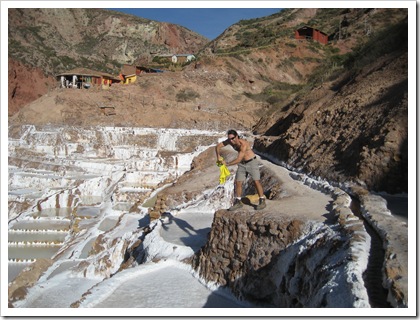
Did you start to miss the llamas again? Ok. We will leave you with one more.
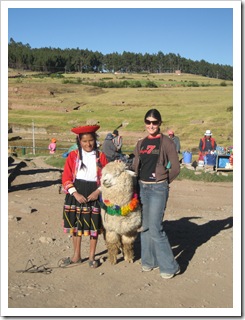
Coming up next, the grande finale of our South American adventure. Our four day pilgrimage to see the breath-taking Lost City of the Incas - Machu Picchu.

No comments:
Post a Comment